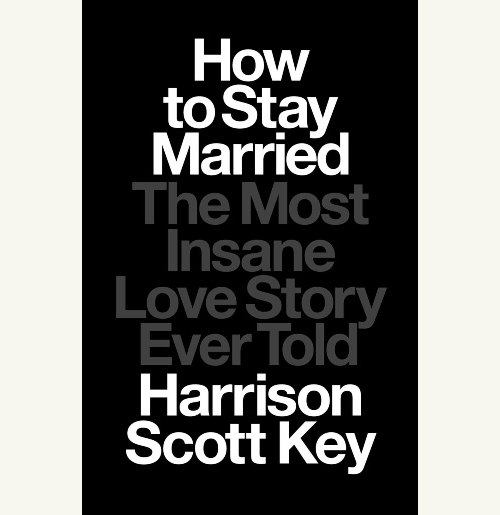Marriage is an institution battered by twin forces. On the one side are the cynics and the increasing number of people who see no point in it. To be yoked to another person for life seems like an unbearable hell. It is banal and bourgeois. It limits and crushes. The evident pain and tragic betrayals do not seem worth the price of admission. On the other are the idealists, those who sugarcoat and romanticize marriage. These see the marriage bed as heaven on earth and a good marriage as the simple product of piety and hard work.
Harrison Scott Key’s How to Stay Married: The Most Insane Love Story Ever Told speaks to these dueling forces. In his beautifully told, poignant, and searing memoir, Key makes the case for real marriage. To those who doubt marriage is worth it, he says, “Make the leap.” To those who idealize marriage, he says, “Be prepared.” To both he shows that for a marriage to survive and thrive, it needs to be embedded in a larger culture and community, a community of friends, family, prayer, sinners, and saints. The married couple cannot be an island unto themselves. And Key does it all with his characteristic humor and warmth.
A memoirist needs a good story and Key learns he’s living one in early October 2017. His wife Lauren emails him that they need to talk that night about “Life.” Key wonders if she might have an addiction or whether she’s about to confront him about his drinking—an “online diagnostic” test tells him he’s no alcoholic. He thinks she may be depressed or wants to have another baby. But it isn’t addictions or babies or depression she wants to talk about. She wants a divorce because she’s in love with someone else.
Rather than turning to self-pity—or divorce—the revelation begins a process of discovery for Key. Key uses the revelations and the up-and-down process of working to save his marriage to think through his marriage and the institution of marriage, to dissect how he and Lauren arrived at this point, and to recognize what flaws and faults of his contributed to the breach. While Key never excuses Lauren’s infidelity, he recognizes that it didn’t arise in a vacuum. In this process of discovery, Key proposes universal lessons for marriage that are relevant for all people whether married, single, or religious. A married couple need not have suffered anything nearly as traumatic as an affair to profit greatly from those lessons. Key’s book, besides being utterly hilarious, addresses the twin forces of cynicism and idealism that threaten the institution of marriage itself.
The cynics fail to see the redemptive suffering-in-communion of persons that marriage can be. The idealist’s approach is emblematic of a vision of marriage that does not candidly acknowledge the reality that the Cross will find one in marriage; the Cross is present in every vocation.
Key’s argument is that real marriage is hard but also an adventure on which it is worth embarking. It is from the crucible that is marriage, that something good, beautiful, and greater than the sum of its parts can be generated. To the idealists, Key writes: “Nobody ever told me that every marriage comes to this cataract in the river many times over, that every marriage goes over the falls. The two of you go tumbling across the smooth mossy rocks of time, and down you go and some couples die and some don’t, but everybody goes toppling.” Lauren, who authors a chapter of the book, echoes a similar theme: “No one really talks about marriage struggles. Not Christians. Not the real struggles. Sex, pain, anger, loneliness. Not a word. You’d think they would. Christians love to talk about sin and struggle, but we look past the many nightmares of marriage like an army of the blind.”
Not every married couple will face the sort of crisis Key and Lauren faced. But they will go over the falls. There will be crises and mini-crises. Sufferings. Loneliness. We need to equip people jumping into the adventure of marriage with this knowledge. Key notes, “I’d witnessed many weddings . . . and never heard a single officiant explain the crucible of suffering that awaits every married couple.”
Yet, such candor would seem to reinforce the cynics’ view and for good reason. What Key is describing seems the very real hell from which the cynic rightly wants to run. But Key doesn’t stop there. Key’s acknowledgment that such suffering will come isn’t throwing a wet blanket on the celebration but recognizing the grand and beautiful adventure the couple is entering. To the cynics, Key says, marriage is the furnace that purifies and sanctifies. That is something we need as human beings. He writes:
Whatever your feelings about Christ being the bridegroom and the church being the bride, here’s what I’ve come to see: Rome slaughtered Jesus, and that’s what marriage will do. It will slay you, crucify and burn and behead you and everything you thought you knew about yourself. And the thing that is left, after all is burned and plucked away, that is the real you.
Marriage is worth it because of the transformation that it works upon the couple. Thus, near, the end of How to Stay Married, Key asks:
What if the prophets [of the present age] are wrong? Are we not freer than ever in human history, and sadder, and more anxious, more wretched? What if marriage, at its very best, exists to remake us into beautiful new creatures we scarcely recognize? What if, in some cosmically weird way, escaping a hard marriage is not how you change? What if staying married is?
Here, one hears an echo of Joseph Ratzinger’s line about Christ who “burns and transforms evil in suffering, in the fire of his suffering love.” While not all the struggles of marriage are evil, and even the evils might not rise to those faced by Key and his wife, these struggles borne in love are what refashion and remake us. They burn away the impurities and fashion a new creation. And that is an adventure worth undertaking.
But the adventure of real marriage is only possible if embedded within and supported by a larger community of love. For marriages to survive and thrive, one needs grace, prayer, and others. For marriages to survive and thrive, the Church must truly be the Body of Christ—it must be a true communio. That means that the Church must be present and supportive of couples in good times and in crisis, it cannot purvey abstractions but tangible, flesh-and-blood charity—it must show us the sort of self-emptying love that St. Teresa of Calcutta showed to those in the slums.
The night Key learned of his wife’s affair, he became a beggar before God. He “crawled out of bed and onto the floor,” and said, “God. Help. Help me. Help me to know what is real.” Key and his wife “were the people who had killed our marriage,” but it was going to have to be they, along “with the help of beings both divine and mortal,” who would “make it live again.” Indeed, as Key writes, “[i]f you want your marriage to survive, you need people in your life who believe in the idea of it.” These were friends who believed that there was a real fight going on between us and principalities and powers.
And such friends cannot recite platitudes and abstractions in these moments of crisis. Key talks about the sort of faith that was needed in his moment of crisis. It wasn’t a false sense of piety. It didn’t offer abstract and abstruse theories:
What did our church do for us, exactly? They came when I called. Handed children to their spouses and got in the car. They listened to news nobody wants to hear. They sat with Lauren, too. They did not tell her she was doing a bad thing and must now do this or that good thing to fix it. She seemed plenty familiar with the moral equations in play. They did not give answers, not at first. They did the harder thing and asked questions. What does it feel like to be her? And in the answering, her heart awoke to something. To know people could see your inside and not revile you, this seemed a surprising new variable of the equation.
These were Christians who knew how to love. In the deepest and darkest moments of pain in the book, Key describes his friends’ unwavering love. They didn’t offer pat solutions. They offered their presence. In them, Key discovers truly that God is love and what that love means—a self-emptying that needs to be recapitulated within marriage itself. And in experiencing the searing and purifying nature of love, Key realizes the concrete nature of God and his love: “What if God and Jesus are metaphors for something too impossible to fathom, which we attempt to fathom anyway? What if the endless fathoming is our duty? What if God and Jesus aren’t metaphors at all? What if they’re real? What if everything else is a metaphor for them?”
How to Stay Married is a profound book that offers a portrait of real marriage that answers both the cynics and the idealists. The cynics fail to see the redemptive suffering-in-communion of persons that marriage can be. The idealist’s approach is emblematic of a vision of marriage that does not candidly acknowledge the reality that the Cross will find one in marriage; the Cross is present in every vocation. With the cynics, we need to acknowledge the very real suffering that marriage can be but then demonstrate that that suffering can and does find purpose in the larger context of the communion of husband and wife and the communion of family, friends, church, and city who need to support and build up each marriage for it to flourish. To them, we need to show marriage as a path to true human fulfillment. With the idealists, we need to help shore them up when the inevitable bumps in the road occur, so they don’t run for the hills and give up.
Marriage lived and embodied within a community of love and prayer is a privileged pathway to virtue and sanctification. Key’s book has changed me for the better. And based on my unscientific sampling of people who have read it on my recommendation, it has changed many others. That How to Stay Married offers profound lessons and is an important book does not mean it is ever pedantic. This is a gripping story told well. It is not a sermon. If you want to have your heart crushed and rebuilt again all while chortling and crying, run, don’t walk to read this incredible book.



